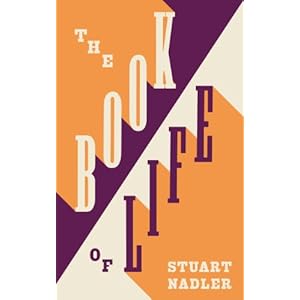The Book Of Life - Stuart Nadler
'where my heart belonged'
I'm going to be brutally honest here and say that I read Stuart Nadler's debut story collection from cover to cover and enjoyed it (not without qualification, there were a few points I knew I would want to make when it came to writing my thoughts up, but in the meantime I set the book down and begun the next one on my list) but when I picked it up again a month or so later to write this post I realised that I could actually remember very little about the seven stories contained within. There are a couple of reasons for this. Firstly, I am a forgetful chap, that's the whole reason why I started writing this blog in the first place; and secondly Nadler has produced a very polished set of stories which share certain themes and traits and their very proficiency means that they lack distinction from each other. In a collection where infidelity, Jewishness and familial relations loom large there is a tendency for the male characters in particular to all seem very similar (even when doing very different things - I think this might be because the dialogue isn't sufficiently different). There are even some moments of actual repetition, like for example the awkward kiss that results from one party going for the mouth and the other for the cheek. Whether these are supposed to be artistic echoes or not the effect is of reading a young writer who doesn't realise that he's repeated a trick in more than one story. Ok, that's the hard bit over (sorry Stuart) let's get on with looking at the actual stories.
There is a distinct whiff of Cheever about the collection as a whole with its suburban families, kids in college, crumbling marriages and infidelities. In fact that feeling is so strong that I had to remind myself that these stories were set in the modern age rather than the 50's and 60's of Cheever. Opening story In The Book Of Life features a man who takes the young daughter of his best friend to bed only to discover that his best friend has been conducting an affair with his wife. Winter On The Sawtooth finds one husband actually cohabiting with his wife's lover but who finally finds the confidence to challenge that after his son visits from college, having found not only love but a new connection with his Judaism. The Moon Landing does actually look back to the ticker tape parade that followed Armstrong et als return to terra firma in 1969, as two brothers clear the house now left empty by the death of both their parents in close succession. Unfortunately for Nadler I had recently read Karl Ove Knausgaard's incendiary novel which uses a similar device and frankly blows this story out of the water.
Perhaps the most effective story about infidelity is Catherine and Henry. At the prompting of a friend, Catherine hires a woman to pose as a model in order to test the fidelity of her artist husband, Henry. She has been made suspicious by finding dozens of paintings of the same woman - 'and in Henry's work she found a new sense of attentiveness that discomfited her. Part of this, surely, was that Catherine believed these paintings to be his best work.' So torturous is the whole sting for her personally that she believes she might be able to forgive him if he fails - 'What she isn't sure she is capable of doing is negotiating her own envy. Absolution, she figures, is what comes after forgiveness.' He doesn't pass the test, the relationship ends and when she goes to visit him two years later, to see whether they might be able to rekindle their romance, she finds a man who has aged more than seems possible in so short a time, whilst she remains deeply affected by the guilt of having set a trap for him.
Characters often know that they feel something that might be called love but like the narrator of the final story, Beyond Any Blessing, 'What I didn't know was whether there was a way to quantify the love I felt in my life. I wanted desperately to find some graph to plot my feelings upon, where I could find inarguable proof of where my heart belonged.' Nadler writes with maturity and insight about the complications surrounding love and relationships, finding great mileage in the many different ways that we can mess them up and continue to make the wrong choices even after having apparently learned from our mistakes. But the shadow of those writers Nadler clearly admires looms a little large in this debut and when coupled with those repetitions I mentioned earlier takes something of the gloss off. Nadler is clearly a writer of promise but it may be his next book (a novel) that truly shows us what he's capable of.







0 comments:
Post a Comment